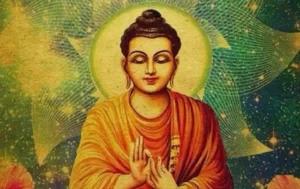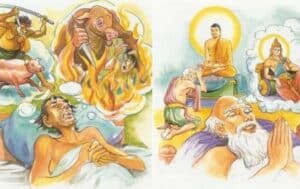Dana Paramita is one of the Six Perfections of the Bodhisattva. Those who do everything for the benefit of sentient beings but have no desire for results, no attachment to doers, means and objects. This is called doing good without expecting anything in return.
Giving is a positive action, we will accumulate a lot of merit if we do it regularly. But even if you give everything you have in life, you can still get in trouble if you give in the wrong way.
Giving means giving away what is one’s own: Wealth, time, effort and also includes spiritual guidance to those who need it. However, the motivations for getting one to practice giving are quite varied.
There are people who give alms for a dark purpose behind it, greedy for fame, make them feel good about themselves, pray for Buddha’s blessing for their loved ones in need or simply hope for a reward something from this action. These are impure motives for giving, since it is always attached with conditions.
Shakyamuni Buddha taught that, when we give others whether material, effort or knowledge, we do not expect reward. We give without being attached to the gift or the recipient. We practice giving to release greed and clinging and at the same time send joy and happiness to everyone.
Some people say that making offerings, doing good deeds is good because it will accumulate merit and create good karma that will bring happiness in the future. However, even this is clinging and expecting rewards. Of the six important practices on the bodhisattva path, the perfection of generosity tops the list.
What is Dana Paramita?

Buddhism is often referred to as the Path of Compassion because the love within Buddhism is vast and profound. The Buddha himself renounced worldly life out of compassion to seek a way to alleviate suffering for all beings. Therefore, Buddhists, when following in the Buddha’s footsteps, must also adopt compassion as the central principle of their practice.
But how can one express compassion and foster its growth? The most profound method is to practice the Dāna Pāramitā, one of the six perfections (Pāramitās) that the Buddha established for practitioners with a broad mind to cultivate themselves and help others transcend the cycle of birth and death and reach enlightenment.
- Dana means giving or generosity.
- Paramita means joyfully, eager to cross to the other shore, the shore of the enlightened beings always towards sentient beings without seeking reward.
Dana paramita is a Sanskrit word, and in English it is called “the perfection of generosity”. It includes 3 aspects: Giving without attachment to the giver, the item and the receiver. These are the three requirements so that the person practicing the perfection of generosity is not attached to the self.
- First: Do not consider yourself a giver of happiness to others, and do not expect others to repay you.
- Second: Do not consider others to be recipients of grace, who must be indebted.
- Third: Do not value the gift that you bring to others, even if it is of great value. When we have given away wealth, effort or spirit, it belongs to someone else, we are no longer attached to it.
Example: A child each month divides a part of his/her salary to his parents, the parents take that money and give it back to his brothers and sisters who are in difficulty. At this point, the selfish son began to scold his parents for giving his money to others.
As the example above, you can see that the act of giving of the child is still stuck in the item, so this act of giving is wrong and not in accordance with the Dana Paramita teachings of Buddhism.
Types of Dana Paramita
The Dāna Pāramitā includes the following types: Material giving, Dharma giving and Fearless giving. Below we will explore the meanings of these types of giving:
1. Material giving: This refers to donating one’s money, possessions, or food. Material giving is of two kinds:
a) Internal wealth: This represents the most precious personal possessions, such as one’s life or well-being. Giving internal wealth means sacrificing one’s life to save others from danger. In the Jataka tales of the Buddha’s past lives, we see many examples of such sacrifice, like the story of a merchant who, when his ship was sinking, let go of the mast he was clinging to, so others could survive.
b) External wealth: This includes everyday items such as food, clothing, money, vehicles, fields, houses, etc. Giving these items to those in need constitutes external wealth giving.
2. Dharma giving: This involves sharing valuable truths, correct principles, or Buddha’s precious teachings to guide and advise others. It also means living according to the Buddha’s precepts earnestly to serve as a model for others to follow good deeds and correct their wrongs. Dharma giving is considered more valuable than material giving because while material giving provides temporary material relief, Dharma giving offers profound spiritual support, benefiting not only the impoverished but also the wealthy and influential across multiple lifetimes.
3. Fearless giving: Fearless giving means alleviating the fears of others, helping them become free from fear. At first glance, this might seem less significant. However, upon deeper reflection, it becomes clear how profoundly insightful the Buddha was in establishing this practice.
Consider how much of human life is dominated by fear: fear of reprimand, violence, supernatural entities in childhood; fear of deprivation, enemies, lack of recognition, or failure in adulthood; and fears of illness, aging, and death in old age. Life’s difficulties are compounded by fears of oppression, corruption, theft, violence, imprisonment, and injustice. To alleviate someone’s fears is to significantly reduce their suffering. Compassionately recognizing the fear-induced suffering of sentient beings, the Buddha devised the practice of fearless giving.
To practice this, a practitioner must first cultivate fearlessness within themselves. A true practitioner, understanding Buddha’s teachings, fears nothing: not poverty, as they do not covet wealth; not obscurity, as they do not seek fame; and not death, as they view life as transient. With such a mindset, their spirit remains undisturbed, and their demeanor calm, regardless of life’s changes or dangers. Those who practice fearless giving bring peace and joy wherever they go, ready to rescue, defend, or vindicate, embodying a presence that imbues calm and happiness in all beings and situations.
What does Theravada Buddhism Say about The Perfection of Generosity?
In the Anguttara Nikaya of Theravada Buddhism, the perfection of generosity is understood as follows:
First: Rejoice and hurry before giving alms. For example, if I know there is a Buddhist event that will take place tomorrow, I will not delay it, but eagerly await that day with great joy to do a good deed that benefits myself and others.
Second: Rejoice while giving alms. Whether that day is too hot or too rainy, or the recipient of the gift is not grateful but also says bad words. We should also not give rise to sorrow and anger. Be happy, knowing that you are doing a good deed.
Third: Rejoice after giving alms. I don’t regret it anymore, if that person treats us badly in the future, we shouldn’t anger and regret it either.
This means that in that moment, in that space, we do that good deed for someone. When the act of giving has ended, later whether the person is grateful to me or not is their problem, we should not care. This is called the perfection of generosity or Dana Paramita in the Anguttara Nikaya.
Although the two sources of the Pali and Mahayana scriptures have different views on the perfection of giving, the main point that we need to keep in mind is this: When we do a good deed, we should clearly understand that we are doing it for himself to perfect the bodhisattva path, thereby leading to the fruit of enlightenment – liberation.
Right Perception of Generosity

The important thing to remember when practicing generosity in Buddhism is:
- Giving those who do not want to receive.
- Giving things that are inappropriate or unnecessary to the recipient at the time.
- Giving and receiving must arise together, cannot be from one side, giving and receiving, receiving and giving are one.
Giving and receiving with this understanding is called the perfection of giving. In Buddhist terms it is called Dana Paramita. You may be wondering why giving and receiving are one?
If you have studied through Emptiness of Nagarjuna, you will understand that giving is empty, without subject and object. If we classify ourselves as givers, receivers and items, we still lack Paramita (perfection). In Buddhism, attachment comes from a habit of mind that makes the world “me” and “everything else”.
If there is a condition behind giving, it leads to possessiveness and a tendency to manipulate everything, including people. In order to have no conditions attached to the practice of giving and taking, we have to realize that, nothing is truly separate, that all things exist by interacting with each other.
This helps us to understand that the giver and the receiver are one. And the gift is same. Therefore, we do not expect “rewards” from the recipient, including a “thank you”. We do not attach conditions when we practice the perfection of generosity.
We won’t get caught up in efficacy, that we haggle over cause and effect for the good deeds we’re doing. Therefore, we have to learn to change our perception of generosity, to see good deeds as urgent and necessary, to do them joyfully and then to forget them.
Although the practitioner of Dana Paramita does not need the recipient’s grace, the recipient must always keep it in mind so that he can return the favor when the opportunity arises. The recipient must take the giver as an example and try to practice Paramita in order to avoid having trouble doing good deeds.
Dana Paramita is sometimes translated as “the perfection of generosity.” A spirit of generosity is more than simply giving money to charity. It is a spirit that responds to the world, giving away what is needed and appropriate at the time. This spirit of generosity is an important foundation on the Bodhisattva path. Hopefully the useful information shared by Lotus Buddhas can help you better understand the perfection of generosity in Buddhism.





